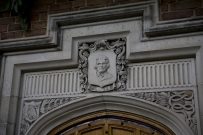The Koch Brothers and other members of the one percent improve democracy by giving voice to views that partisan politicians neglect.
Learning for Life: Political Education According to Michael Oakeshott
In a world in which everything is politicized — even the choice of food! — it is difficult to find conversations that involve actual politics and not ideology. For the most part, people are not trained or educated in politics, and so they regurgitate one ideological doctrine or the other. In order to know what real thinking and proper political discourse should look like, it’s very important to define and single out ideology. For British philosopher, Michael Oakeshott (1901-1990), ideology limits the possibilities of the individual mind and by implication, the possibilities of productive discourse.
In his essay, “Political Education” (1951, and reprinted in 2001 by Liberty Fund as a part of The Voice of Liberal Learning), Oakeshott makes a crucial distinction between political ideology and politics. His timely reflections can illuminate and help us move beyond the current onslaught of identity politics in the public square. Just as Oakeshott explored what makes political education unique and necessary, we too should be concerned with this very issue.
Oakeshott reflected extensively on the importance of politics in people’s lives. For him, political education is not limited to the classroom, although a “reflection on political activity may take place at various levels,” one of these being philosophy (182). But, what makes politics unique is that it’s grounded in real life, which is composed of both action and contemplation. Political ideology, on the other hand masquerades as philosophy, and it “purports to be an abstract set of principles, or a set of related abstract principles, which has been independently premeditated (164).
Regressing further into a theoretical abstraction is a hallmark of political ideology. This, however, is not its only inadequacy. Being “independently premeditated” means that political ideology is not concerned with an organic opening and development of the mind. Rather, it has an attachment to a particular abstract principle and it forces the reality to fit into that principle. This ‘symptom’ of bad thinking that Oakeshott is describing resides primarily in the abstract empiricism of ideology, which has to do with a “style” of politics rather than real political activity.
Politics or political activity for Oakeshott is very much connected to the idea and reality of the community. It is “an activity of attending to the general arrangements of a set of people whom chance or choice have brought together” (159). Politics is relational in nature and it is in those relations that we learn how to navigate through any community which we may be part of. Unlike political ideology, political activity is not primarily concerned with theoretical musings but what kind of human beings are created in the process of politics. With this argument, Oakeshott affirms the dialogue between the individual and the community.
Politics is an act, but not one identical to activism. In our current state of affairs, we witness ideology daily in empty and meaningless slogans, whether it comes from established media figures, protests, or general social media exchanges among people. It all amounts to what we may call ‘hashtag politics.’ We understand the activity of politics when we recognize that the world we inhabit is not a haphazard mess but a “concrete whole” (161). The actual political act extends beyond static terms, which are the territory of ideology. Rather, a political act has the “source of its movement within itself” (161). What Oakeshott means is that politics, by nature, is a movable act dependent upon individual thought.
Since human beings are not inherently inert creatures, we can’t expect to grow intellectually from the diet of political ideology. Political ideology, just like today’s identity politics, is an immovable set of terms, which seeks revolution for revolution’s sake, agitation for agitation’s sake. It posits a view of reality before any encounter with actual and individual lived experience. From this seat of fake wisdom, its proponents coerce and force real events into being assessed through an artificially created framework. There is no room for an individual voice in this joyless theoretical grid. As Oakeshott remarks, “Wherever else politics may begin, they cannot begin in ideological activity” (173). In a moment when the citizen’s voice is silenced, then he has ceased to engage in political activity.
If the signs of political ideology are cold empiricism and coercion of individual thought, then real political activity must involve freedom of individual thought that acknowledges the past intellectual efforts but also looks to the future.
It’s not enough to either “be concerned” or to know “one’s own tradition of political activity” (182). It is only natural that we know what we are familiar with and what we encounter every day. This is what our lives are composed of. But in order for political activity to also be a political education, it
must embrace… knowledge of the politics of other contemporary societies.… The study of another people’s politics, like a study of our own, should be an ecological study of a tradition of behavior, not an anatomical study of mechanical devices or the investigation of an ideology. And only when our study is of this sort shall we find ourselves in the way of being stimulated, but not intoxicated, by the manners of others” (182)
The originality of Oakeshott’s thoughts on education truly lies in the above paragraph. For him, politics is also metaphysics, and this is one of the most important aspects of this essay. This assertion certainly goes against political and philosophical tradition that politics is just a set of principles which are sometimes applied in order to gain a particular outcome. Metaphysics, on the other hand, inevitably involves an individual’s interior life, which is composed of memory, ethics, a relation to the particular community, and generally speaking, a world view. Without affirmation of metaphysics in political activity, we are indeed just a series of abstract constructs, devoid of humanity, and slaves of political ideology. Not only is politics about the wholeness of the person, it is also about the wholeness of thought. Person and thought are never separated, just as an individual and community aren’t either. If the person is seen only as a concept, then it shouldn’t be surprising that it will limit knowledge, reason, and ultimately education itself.
In order for political activity to flourish, we have to recognize that politics originates in a personal encounter, which ought to always be in concert with knowledge and learning. This is why the metaphysics of an individual person is the most important ingredient for the flourishing of our society.
Education, and certainly political education, is not about rigid terminology, which is what ideology offers. It is about a constant opening of the mind, and “the more profound our understanding of political activity, the less we shall be at the mercy of a plausible but mistaken analogy, the less we shall be tempted by a false or irrelevant model” (184). At the heart of this unfolding of the mind is a face-to-face encounter. An encounter such as this doesn’t create an imposition or a coercion for the person with whom we are engaging. Rather, it is a political activity that is grounded in freedom, which begins with the individual and naturally continues into the folds of the community.
In order for such a political activity to occur, we have to recognize the inherent dignity of another person. The question we have to ask is whether an act of learning is contributing to the growth and flourishing of ourselves and others, or is it taking us into the depths of unenlightened ideological repetitions. As we learn about others in an encounter, as we recognize their humanity, we shall also be surprised by the new knowledge we unearth about ourselves.


